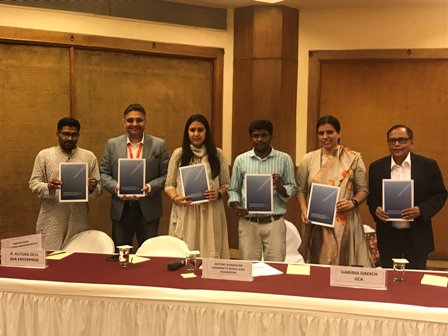Localisation of Child Rights and Business Principles: The Next Business Agenda
The consultation was held, marking ten years of CRBP, with multiple stakeholders—businesses, business leaders and children.
A multi-stakeholder discussion on Localisation of Child Rights and Business Principles (CRBP) was held in Delhi to make businesses aware of the policies they should implement to abolish child labour practices.
held in Delhi to make businesses aware of the policies they should implement to abolish child labour practices.
Leading the conversation, Yasumasa Kimura, UNICEF Deputy Representative, Programmes, said, “Ten years since the Child Rights and Business Principles were developed, UNICEF remains committed to advancing this movement with public and private sector partners – not only to promoting this framework for businesses to respect and support children’s rights, but to apply these principles to help maximize the positive contributions and minimize negative impacts on children. We are proud of our partnerships with key industry associations, business networks and platforms, and academic institutions. We will collectively continue to promote policies and practices to improve the social impacts of business related to child rights. The examples shared by partners today speak to their conviction and creativity in mainstreaming child rights in workplaces, marketplaces, and communities.
We look forward to engaging with many more businesses in India to collectively enhance the uptake of CRBPs across value chains.
Moderating the discussion, Anindit Roy Chowdhury, Chief of Programmes, Save the Children, India, said, “This year is the 10th anniversary of Child Rights and Business Principles that was created by Save the Children, UNICEF and UNGC, but commemorating it is not going to be enough, there’s a lot more that needs to be done. We need to create functional and equitable collaboration between businesses, civil society organisations, governments, and children themselves, that promote business practices that value and ensure child rights. We must all work in partnership to address the various nuances of child rights in business supply chains and processes. Also, businesses cannot be considered the source of the problem; it is an inevitable reality of this world. Therefore, making them responsible through dialogue, capacity development, and collaboration is the critical way forward”.
Sandip Ghosh, Secretary of Sustainability Indian Tea Association (ITA), shared that “Child Rights and Business Principles have been foundational for the engagement with tea estate managers as they have enabled the promotion of the most conducive business policies and practices in their estates”.“He added that over the last few years as the ITA, we have focused on a range of actions that Tea Estate managements can take to respect, support, and advance children’s rights and ensure any adverse impacts are prevented and addressed”.
Key business leaders/partners demonstrated tangible, transformative shifts in businesses that have enabled the realisation of child rights, including policy commitment and ensuring due diligence to identify any actual and potential impact the business might have on human rights in all parts of its operations. The principles address a wide range of ways businesses impact children’s rights, including providing decent work for parents and caregivers and through their impact on the environment.
Covering a wide range of critical issues – from child labour to marketing and advertising practices to the role of business in aiding children affected by emergencies – the Principles have enabled companies everywhere to respect children’s rights through their core business actions, but also through policy commitments, due diligence and remediation measures. Long-term partnerships with industry associations and businesses have shown the meaningful application of these principles to support the realization of children’s rights.
Partners in Change launched a Working Paper on BRSR through the lens of Child Rights. During the launch, Pradeep Narayanan, Director of Partners in Change, said, “The working paper provides a child rights reading, analysing the questions from the sensibilities of a society respectful of child rights. The BRSR leaves a large scope for questions for companies that can create a space for a clear understanding of how children and child rights are impacted by business operations and the need for businesses to recognise the human rights of children.”
Building on the Guiding Principles of Business and Human Rights, the CRBP was the first comprehensive set of principles to guide companies and businesses on the range of actions they can take to respect children’s rights in the workplace, marketplace and community. The CRBP calls on companies of all sizes to integrate respect for children’s rights into their core business activities – from decisions and strategies to business models and broader sustainability efforts. And these can be used by governments to ensure that business policy and regulation create an environment that builds that respect.
Since its inception in 2012, over the past ten years, the principles have inspired many businesses, regardless of their size, sector or location. They inspire action in management suites, farms and factories and create change in law, standards and practice addressing business impact on children.
Garima Dadaich, Associate Professor, Business Environment, Indian Institute of Corporate Affairs, Imran Khan, Executive Director, International Chamber of Commerce, India, R. Rutgra Devi, Owner AVA enterprise, Anthony Jayaseelan, Coordinator, Sanarpathy block level federation, Dindigul, Tamil Nadu, Jahanvi Naidu, Human Rights and Inclusion Manager, Olam Food Ingredients, Indonesia, too participated in the discussions.
The consultation was held, marking ten years of CRBP, with multiple stakeholders—businesses, business leaders and children—to showcase the evolution of CRBP in business practice. The overarching objective was to create an enabling environment around CRBPs by creating a dialogue to demystify the principles and showcase how CRBP has grown principles to practice, reinforce commitment and foreground ambition inspiring businesses to embed CRBP. It was convened by core partners Save the Children, UNICEF, and Partners in Change.
